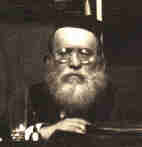 |
Hadrash Ve-Haiyunby the Reisha Rav, HaGoan Rav Aaron Levine TZ"LElucidated and Adapted by Efraim Levine |
 |
Hadrash Ve-Haiyunby the Reisha Rav, HaGoan Rav Aaron Levine TZ"LElucidated and Adapted by Efraim Levine |
Ki Seitzei
Dedicated in Honor of
Nosson Levine
and
Tzippy Herzka
On their forthcoming marriage
To Dedicate Please Contact Hadrash Ve-Haiyun
If a birds nest happens to be before you on
the road, on any tree or on the ground; young birds or eggs; and
the mother is roosting on the young birds or on the egg, you
shall not take the mother on the young. You shall surly send away
the mother and take the young for yourself, so that it will be
good for you and you will prolong your days.
(Devarim 22:6-7)
One reason given for the requirement of sending away the mother before taking the young or eggs is to have pity on the mother. The mother suffers immensely upon witnessing her young or eggs snatched before her eyes. The Torah commands us to first send away the mother and thus spare her the pain.
The Mishna (Berachos 33b) teaches: If one prays, “Upon the birds nest your mercy extends, so too may you have mercy upon us,” he must be silenced. The Gemara offers two reasons as to why he must be silenced. The first is that although it is true that Hashem required us to send away the mother out of pity, however such a statement falsely implies that Hashem does not have pity on other creatures other than the bird.
The second reason is that when we perform the commandments our main intent must be because it is a decree of Hashem and not seek to delve into the logic behind the mitzvos. It is true that we may derive moral lessons from the mitzvos but this may not be our primary reason for their performance. A person who prays with the above expression conveys that the main reason he fulfills this command is out of mercy not because it is a decree of Hashem.
The Gemara continues to relate a story where a Torah scholar led the prayers in the presence of Rava. In the course of the prayers this scholar beseeched Hashem with the words “You Hashem have pity upon the birds nest, so too may you have pity upon us.” Upon hearing this supplication Rava commented to Abayai that this scholar knows how to properly beseech Hashem. Abayai retorted, that the Mishna clearly states that one who prays in this manner must be silenced. To this the Gemara concludes that Rava certainly knew this Mishna and only made this statement to test Abayai.
This Gemara begs explanation. First, the Gemara calls the individual who lead the prayers a scholar. But how can he be a scholar and not be aware of the well know Mishna that does not allow for such a prayer? Also, why did Rava test Abayai on a simple Mishna?
In order to answer these questions we must return to the first reason as to why it is forbidden to utter such a prayer. We have explained that this is because this expression implies that only upon the bird does Hashem has pity but not upon other creatures. However, this implication is only true if the subject i.e., the bird, precedes the action i.e., pity, but not vice versa. For example, if one were to say in Hebrew, “Reuven ate bread,” this would imply that he ate only the bread and nothing else. However, if one were to say in Hebrew “The bread was eaten by Reuven,” then according the rules of Hebrew grammar there would be no grounds to imply that other things were not eaten.
The same is true here with regard to the bird. The Mishna forbids one to say “Upon the bird do you have pity, so too may you have pity upon us.” In this Mishna the noun i.e. bird, precedes the verb i.e., pity, it therefore leads us to derive that upon other creatures Hashem does not have pity. This is certainly false and therefore such a prayer is forbidden. However, the scholar who led the prayers reversed the order as said “You have pity upon the bird, so too may you have pity upon us.” Such an expression does not imply that upon other creatures Hashem does not have pity. Therefore, if the only reason the Mishna would prohibit a prayer that makes mention of the birds nest is because of the false implication, then in this case it would be permitted as there is no implication at all. This was the intent of the scholar who led the prayers and this was the intent of Rava complementary statement. However, this only removes the first reason as to why such a prayer is not allowed, the second reason though still remains in force. Even with the reversal, such a prayer does imply that the primary reason one fulfils this Mitzvah is out of pity not due to the decree of Hashem. This was the mistake of the scholar who led the prayers. He did not know that there was a second reason for the prohibition to mention the bird’s nest in ones prayers. This was also the test of Rava. He wished to see if Abayai knew that there was another reason as to why it is forbidden to say this prayer.